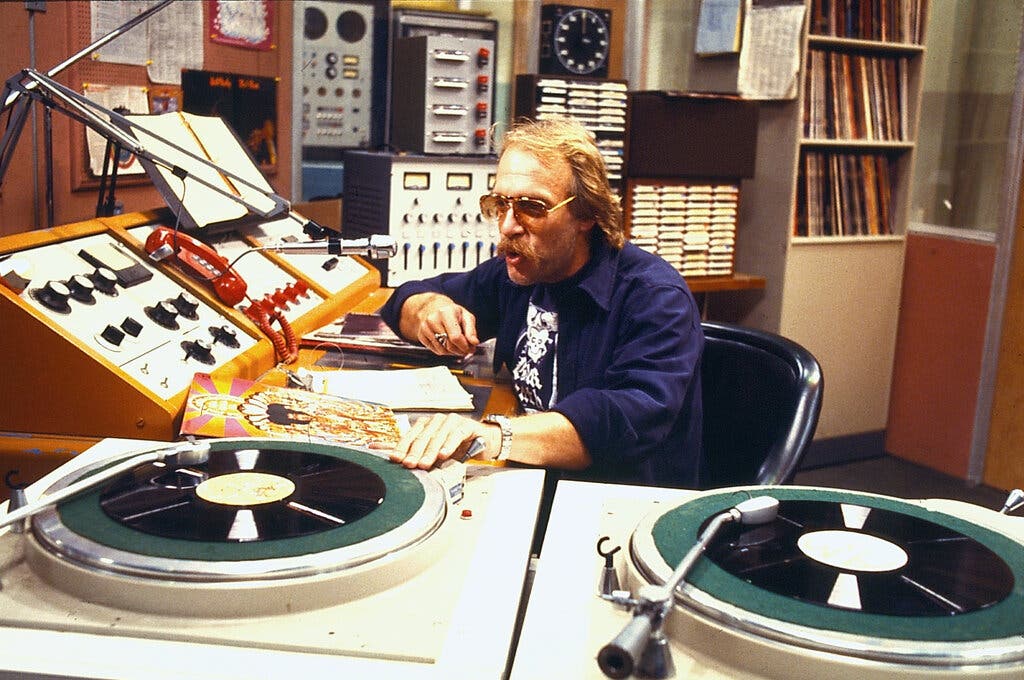Published:January 30, 2022
-New York Times
Howard Hesseman, the actor and improvisational comedian best known for playing a stuck-in-the-’60s radio disc jockey in the TV sitcom “WKRP in Cincinnati,” died on Saturday in Los Angeles. He was 81.
His wife, Caroline Ducrocq, said he died at the Cedars-Sinai Medical Center of complications from colon surgery last summer.
Mr. Hesseman received two Emmy nominations for playing Dr. Johnny Fever on “WKRP in Cincinnati,” which ran on CBS for four seasons from 1978 to 1982.
The series portrayed a struggling Top 40 rock radio station, where the staff rages against the age of disco with hard rock and punk songs. Mr. Hesseman’s hard-living character, having been pushed from a Los Angeles station where he was a star, serves as a senior member of the counterculture at the Midwestern outlet after smooth-talking his way into a job.
“I think maybe Johnny smokes a little marijuana, drinks beer and wine, and maybe a little hard liquor,” Mr. Hesseman told The New York Times in 1979. “And on one of those hard mornings at the station, he might take what for many years was referred to as a diet pill. But he is a moderate user of soft drugs, specifically marijuana.”
Johnny Fever was a cherished character on TV who embodied the essential traits of 1960s counterculture: the worship of rock bands; not-so-veiled drug references; long, shaggy hair.
In one scene, he is wearing dark sunglasses while D.J.ing, speaking in a relaxed tone as he leans into the microphone and says in a thick voice, “We’re still rocking on the mighty KRP, where the razor man is standing by to sharpen up your day.”
He told WXYZ-TV Detroit in 2012 that the show was made up of “a lovely company of actors, bolstered by a lovely bunch of writers, so it made going to work fun every day.”
Some were probably not surprised to see Mr. Hesseman excel in that role. In San Francisco, where Mr. Hesseman helped start an improvisational comedy troupe, The Committee, he worked as a radio D.J. in 1967. At the Bay Area station, KMPX, he played “strange tapes” from the rock movement and smoked “a lot of pot — always against my will, of course,” he told People Weekly in 1979.
Mr. Hesseman told The Times in 1979 that he spent 90 days in the San Francisco County Jail in 1963 for selling an ounce of marijuana — a conviction that was later thrown out for entrapment. He would later say that smoking marijuana was “sort of a residual hobby.”
George Howard Hesseman was born Feb. 27, 1940, in Lebanon, Ore., and raised as an only child by his mother and stepfather.
An uncle in Colorado told him about acting, and years later, Mr. Hesseman would say, “Every time that I perform, it’s like repaying him a debt.”
He briefly attended the University of Oregon, but he left school and moved to San Francisco, where he could focus on his career.
Mr. Hesseman, who was also admired for his improvisational talent, played small parts in “The Andy Griffith Show” and “Sanford and Son.”
George Spiro Dibie, the former national president of the International Cinematographers Guild, recalled in an interview with the Television Academy Foundation that Mr. Hesseman’s experience was evident on the set of “Head of the Class,” a sitcom that ran on ABC from 1986 to 1991.
“He was even telling some directors what to do,” he said. Mr. Hesseman played Charlie Moore, a teacher at a Manhattan high school contending with a class of overachieving students.
He landed roles in cult classics like the mockumentary “This Is Spinal Tap,” where he acted alongside Michael McKean, who said on Twitter on Sunday that it was “impossible to overstate Howard Hesseman’s influence on his and subsequent generations of improvisers.”
Impossible to overstate Howard Hesseman’s influence on his and subsequent generations of improvisors. The first time I saw him on stage (Troubadour, ’71, with The Committee) I saw that he was the real deal. He was a friend for 50 years. 1/3
— Michael McKean (@MJMcKean) January 30, 2022
In 1981, after two marriages ended in divorce, he met Ms. Ducrocq, an actress from France who was visiting Los Angeles. Ms Ducrocq’s friend asked her if she wanted to swim at an actor’s pool, and she said yes.
“I had no idea who he was,” Ms. Ducrocq said, laughing.
She stayed at his place for dinner, and then stayed when he brought out a bottle of Champagne, which, she later learned, he had never drunk in his life. In 1989, they married.
He loved listening to jazz, swimming and catching up with his godchildren, she said.
Mr. Hesseman once said in an interview that “the smile keeps you feeling younger; work keeps you feeling a little bit more agile.”
He is survived by Ms. Ducrocq.




